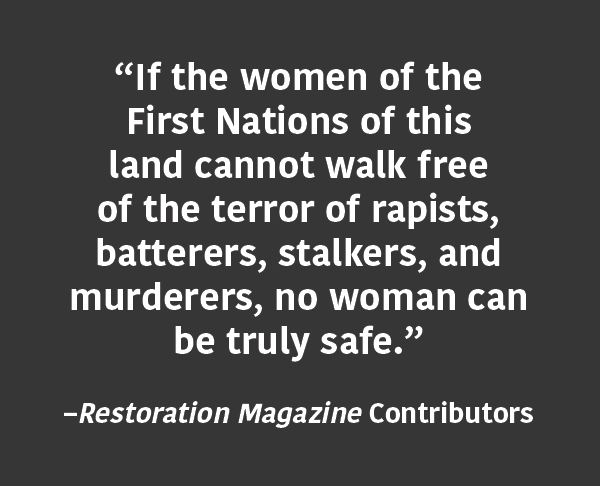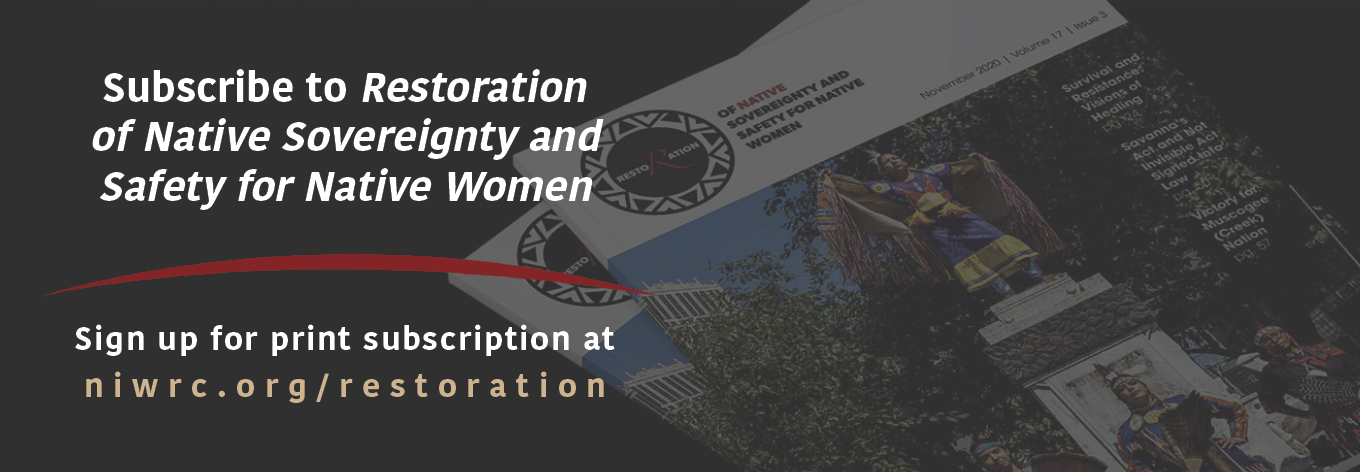Editor's Note | Vol. 20 | Issue 1
Twenty years ago, in November 2003, the National Congress of American Indians (NCAI), Sacred Circle, Clan Star, and Tribal Domestic Violence and Sexual Assault Coalitions launched the NCAI Violence Against Women Task Force (NCAI VAW TF). The seed for the TF was in a 2000 NCAI annual resolution. The Task Force has provided a vehicle for uniting Tribal Nations and organizations to monitor national legal and policy issues, including challenges to the Violence Against Women Act, hold the United States accountable for assisting Tribal Nations with safeguarding the lives of Native women including through government-to-government consultations, and develop and implement a national, Tribal platform of law and policy reforms needed to remove systemic barriers.
Thank you to everyone who came together in 2003 to form the NCAI VAW TF and many of you who have shared your prayers and energy and helped make life-saving changes in federal, Tribal, and state laws and policies. A special thank you to our TF Co-Chairs over the past twenty years for their strong-hearted leadership. We honor you and your legacies of political organizing to restore sovereignty and safety for Native women—Juana Majel Dixon, Karen Artichoker, Terri Henry, Lynn Hootch, Michelle Demmert, Cherrah Giles, and Shannon Holsey. May the next generation of leaders be inspired by your leadership. The strong-hearted energy of the current and next generation of leadership renews us. Given what we are seeing today, we are excited for the next twenty years. We will take the opportunity this year with articles to reflect on lessons learned and current organizing to restore sovereignty and increase women’s safety. At a 2012 conference organized by the Northern California Tribal Healing Coalition, Elizabeth Lara-O’Rourke (Hupa, Yurok, and Chilula) spoke and shared that in Hupa, the word leader means someone who makes you feel beautiful. Indigenous leadership concepts are so different from Western concepts and rich with possibilities for how we continue to effect social change, decolonize and Indigenize to restore sovereignty and Indigenous women’s safety. Please join us for upcoming NCAI VAW TF meetings and share with us what you envision for Indigenous nations and women in 2043.
 In February 2004, three months after the birth of the TF and nineteen years ago, the NCAI, Sacred Circle, and Clan Star organized an NCAI Legislative Reception and launched Restoration of Native Sovereignty and Safety for Native Women Magazine and initiatives restoring safety and dignity to Native women. Restoration has been a critical communication bridge and tool for social change informing and engaging with Tribal, state, and federal policymakers from the unique perspectives of Indigenous survivors, advocates, leaders, organizations, and allies. Our task for the next decade is to identify and organize the national platform of issues, systemic barriers, reforms, and social changes that will continue to restore the sovereignty of Tribal and Native Hawaiian Nations and the safety and dignity of Indigenous women.
In February 2004, three months after the birth of the TF and nineteen years ago, the NCAI, Sacred Circle, and Clan Star organized an NCAI Legislative Reception and launched Restoration of Native Sovereignty and Safety for Native Women Magazine and initiatives restoring safety and dignity to Native women. Restoration has been a critical communication bridge and tool for social change informing and engaging with Tribal, state, and federal policymakers from the unique perspectives of Indigenous survivors, advocates, leaders, organizations, and allies. Our task for the next decade is to identify and organize the national platform of issues, systemic barriers, reforms, and social changes that will continue to restore the sovereignty of Tribal and Native Hawaiian Nations and the safety and dignity of Indigenous women.
I felt honored, proud, and inspired to represent NIWRC at a recent meeting of organizations known as the Domestic Violence Resource Network (DVRN), funded by the U.S. Department of Health and Human Services’ Family Violence Prevention and Services Act Office (FVPSA). The DVRN informs and strengthens domestic violence intervention and prevention efforts at the individual, community, and societal levels. In 2011, NIWRC carried on serving as the National Indian Resource Center Addressing Domestic Violence after Sacred Circle had served in that capacity within the DVRN since 1997. For 20 years, Sacred Circle/NIWRC had been the only Tribal organization within the DVRN—a group of less than a dozen national organizations. In 2017 and 2021, FVPSA supported, and the DVRN welcomed three other Tribal organizations, the Alaska Native Women’s Resource Center, StrongHearts Native Helpline, and the STTARS Indigenous Safe Housing Center. Today, the DVRN has grown to 22 organizations. The recent meeting welcomed three more Indigenous organizations—the Pouhana O Nā Wāhine, the Minnesota Indian Women’s Sexual Assault Coalition, and the Alliance of Tribal Coalitions to End Violence. This growth reflects our strengthened capacity and bright future ahead of us. We are the present and future that our Grandmothers, Mothers, Aunties, Grandfathers, Fathers, and Uncles dreamed and prayed for.
For 2023, as we come together in face-to-face gatherings post-COVID-19, we have much to look forward to—in Indigenous communities across the country, internationally, and with the federal government, including the annual VAW government-to-government consultation and other opportunities for national dialogue, including with the Not Invisible Act Commission and Congressional efforts that continue to center sovereignty and Indigenous women’s safety. We look forward to you joining us for our 2023 National Week of MMIW Action May 1-5 (schedule included in this edition) and helping to organize local events to advocate the connection of MMIW to other forms of abuse and violence that Indigenous women and relatives experience, at our upcoming Women Are Sacred Conference on June 26-28, and other events, in person and virtually.
Strong hearts united, organizing for change.
— Paula S. Julian
(Washté Wiya, Good Woman), Filipina
Editor of Restoration of Native Sovereignty and
Safety for Native Women & Interim Director for Policy





